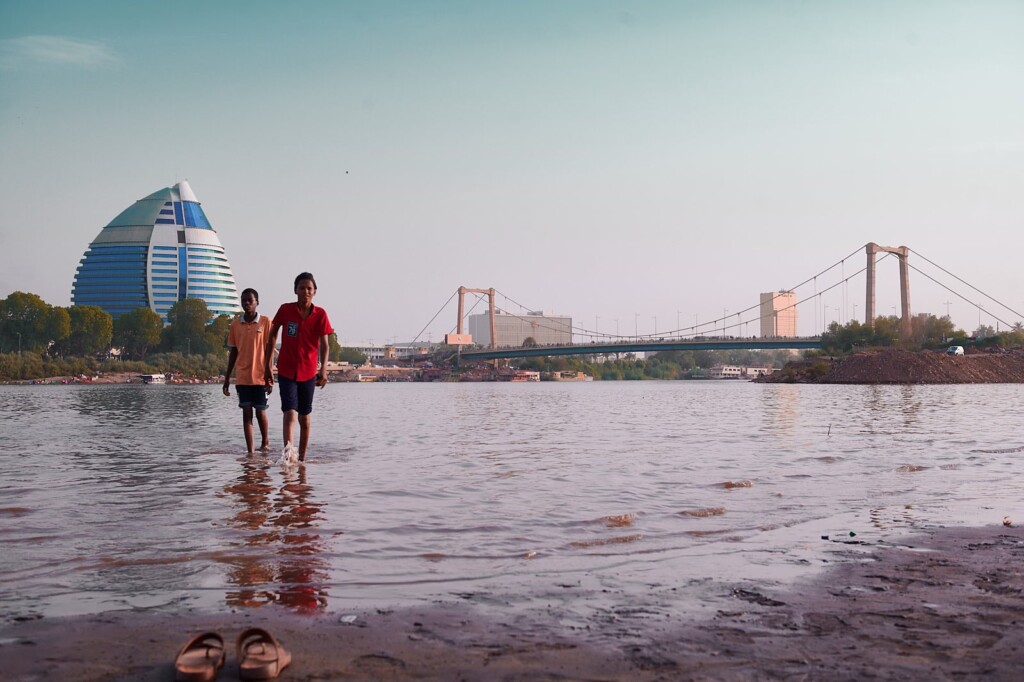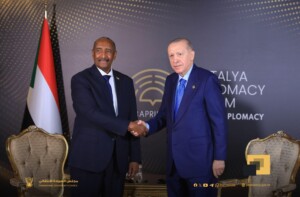Sudanese shrug shoulders at Political Framework Agreement ‘being touted as end of military rule’
While civilians and pundits cautiously welcomed Sudan’s new framework agreement, and others lauded its signing on Monday, several political parties and groups have expressed their categorical rejection of a settlement with the military.
 Two boys walk along the shore of the meeting point of the Blue Nile and White Nile, pictured in front of five star Corinthia Hotel in Khartoum on Tuesday (Photo: Sari Omer)
Two boys walk along the shore of the meeting point of the Blue Nile and White Nile, pictured in front of five star Corinthia Hotel in Khartoum on Tuesday (Photo: Sari Omer)
While civilians and pundits cautiously welcomed Sudan’s new framework agreement, and others lauded its signing on Monday, several political parties and groups have expressed their categorical rejection of a settlement with the military.
In interviews with Radio Dabanga, many Sudanese, stressed by daily worries, shrugged their shoulders at the news that the agreement had been signed. The Sudanese “are seriously underwhelmed by what's being touted as the beginning of the end of Sudan coup military rule,” a tweet on Monday read. “Excitement [and] anticipation levels [are] almost zero, regarding [the] signing of framework agreement today.”
Some civilians, members of resistance committees, and other Sudanese activists reacted positively to the signing of the framework agreement between the military junta and about 40 political parties and professional associations in Khartoum on Monday.
The agreement will be followed by the signing of a final agreement between the two sides on several outstanding issues, scheduled for the end of this month, after which a new transitional civilian government of technocrats will be formed.
'Step in the right direction'
Awatef Abdelrahman, head of the Sudanese Displaced Women Network, welcomed the framework agreement and considered it a "step in the right direction" towards real peace and justice. During an interview with Radio Dabanga, she called on “all forces to sign the framework agreement in order to implement the Juba Peace Agreement, which will allow the displaced to return home.”
The agreement will eventually “allow the displaced to return home.”
– Awatef Abdelrahman
Babiker El Sharif, the brother of a protestor who was killed during anti-junta demonstrations also expressed his support for the current political process, “as it will end military power” in Sudan.
Journalist and political analyst Shawgi Samoud welcomed the framework agreement, hoping that the signatories will stay committed to it. In an interview with Radio Dabanga, he said it is most important to present the agreement to “the youth and the resistance committees to convince them of its value,” especially since “those who reject the agreement haven’t presented any alternative vision that would lead Sudan forward.”
Samoud called on “the streets” to support the agreement, “especially because of the deteriorating security situation and economic conditions due to the absence of a government for a full year.”
'Bilateral and exclusionary'
Several political parties and groups however refused to sign the framework agreement. The mainstream Arab Socialist Ba’ath Party said in a press statement yesterday that “any agreement with the putschists threatens the continuation of a civilian government.”
They decided not to sign the agreement, despite trying to convince other political groups to engage in “a continuous dialogue within the Forces for Freedom and Change.” They also recommended rejectionist groups note the “importance of uniting and mobilising the forces of the revolution and the various components of the revolutionary movement in the broadest popular alliance.”
The Communist Party of Sudan expects the agreement with the military to fail. Ali El Kenein, member of the party’s Central Committee, told Radio Dabanga that the agreement has been signed “under pressure from the international community, especially the US, and the military and some members of the FFC-CC in order to preserve power interests in Sudan.”
Jibril Ibrahim, head of the Justice and Equality Movement, and currently Minister of Finance denounced the framework agreement as “bilateral and exclusionary.” He said in a post on Twitter yesterday that the framework agreement will not achieve stability in the transitional period and will not lead to free and fair elections.
Siddig Tawer, a leader in the Socialist Ba’ath Party and former member of the Sovereignty Council also told Radio Dabanga that the framework agreement may fail. He ruled out the possibility of reaching a final agreement “that achieves the goals of the revolution.”
Signing the agreement is “a strategic mistake as well as a big trap.”
– Siddig Tawer
He called the signing of the framework agreement “a strategic mistake as well as a big trap,” alluding to the “mines” placed within the agreement.
Allowing El Burhan to sign the framework agreement contradicts the idea of a withdrawal of the armed forces from political action, he said. “The agreement acquits El Burhan from the responsibility for the coup, and considers him a key party to the resolution of the current crisis, despite his outright hostility to the revolution. The balance of power is tilted in favour of the putschists.”
Regarding his party's relationship with the mainstream Forces of Freedom and Change, Tawer said that they will discuss the issue soon. Many parties have frozen their membership in the alliance, and are planning protest actions.
Committees’ unification struggle
In response to the signing, some resistance committee leaders called for demonstrations against the agreement. According to Al Jazeera’s Hiba Morgan, anti-military protesters said that the deal “doesn’t meet their aspirations” and that they had been “excluded from the talks.”
Ashraf Khojali, a member of the Hasaheisa Resistance Committees in El Gezira, reacted by saying that the signing of the framework agreement took place under “extreme external pressure on El Burhan and the Forces for Freedom and Change.” He said he rejects any military interference in Sudanese affairs.
Hozeifa Omar of the Kassala Resistance Committees also opposes the framework agreement and declared their adherence to the People's Power Charter, issued by the El Gezira Resistance Committees in January, and supported by resistance committees in many states.
“It fulfils the demands for a radical solution gradually and works to solve crises, especially for the Blue Nile Nuba Mountains region.”
– Ismail Kenek
Ismail Kenek from the resistance committees of the Blue Nile region welcomed the signing of the framework agreement. “It fulfils the demands for a radical solution gradually and works to solve crises, especially for the Blue Nile Nuba Mountains region.”
His colleague Osman Ghaboush agreed. “The framework agreement is an acceptable solution that presents a road map to get out of the current stalemate,” he said, and called for “credibility in its implementation.”
Rejectionists
The Forces for Freedom and Change-Democratic Block (FFC-DB), dominated by rebel movements and eastern Sudan opposition parties and groups, announced that they will join “the demonstrators in the street” and “to bring the framework agreement down within three months.”
FFC-DB spokesperson Juma El Wakeel spokesperson for the Forces for Freedom and Change (Democratic Bloc) told Radio Dabanga that “the majority of Sudanese people reject the framework agreement.” He further warned of “its great impact on the implementation of the Juba Peace Agreement,” but did not elaborate on the subject.
Mohamed Yousef El Mustafa, head of the Sudan People's Liberation Movement-North in Government-Controlled Areas, reiterated that the ongoing settlement is just a power-sharing deal between the military and civilian elites in central Sudan.
The ageement “avoids serious dialogue that addresses the roots of the Sudanese crisis.”
– Mohamed Yousef El Mustafa
In a press statement on Tuesday, he said that the agreement “avoids serious dialogue that addresses the roots of the Sudanese crisis,” while it should lead “to consensus on the establishment of a secular, decentralised, multi-identity New Sudan, cohesive on the grounds of voluntary unity.”
The Sudan Forensic Doctors Syndicate also declared its rejection of “the settlement of the FFC-CC with the putschists and the remnants of the former regime.” In a statement on Monday, the doctors criticised “the miserable attempt to water down the revolution, ignoring the goals to establish freedom, peace, and justice,” and called for “a complete overthrow of the putschists.”
El Waleed Ali, spokesperson for the Sudanese Professionals Association-Radical Change faction told Radio Dabanga that they adhere to the three slogans of the revolution: No Negotiation, No Legitimacy, and No Bargaining with the military. He explained that the ongoing political process is a settlement that concerns some political forces and the former regime, pointing out that the group of generals in power “now represents the interests of the parasitic exterminated regime.”
Thorny issues postponed
Five important contentious issues still have to be discussed further as there are differing opinions within the coalition. The outcomes will be laid down in a ‘final agreement’, which is still expected to be reached at the end of this December.
The thorny issues are concerned with justice and transitional justice, security and military reform, approaches to empowerment* removal, possible amendments to the Juba Peace Agreement, and governance issues regarding eastern Sudan.
The Eastern Sudan Groups Coordination Committee described the framework agreement as “a suspicious, imported settlement based on a secular constitution” in a press statement on Tuesday.
The agreement is “a suspicious, imported settlement based on a secular constitution.”
– Eastern Sudan Groups Coordination Committee
The Coordination Committee, headed by Nazir Sayed Tirik, further repeated its rejection of the Eastern Sudan Protocol of the Juba Peace Agreement, and demanded a “new negotiating platform that discusses all the problems of the East.”
The High Council of Eastern Sudanese Native Administration Leaders announced its support for the framework agreement, and said in a statement that it makes the situation in eastern Sudan “an important national issue that needs extensive discussion.”
The agreement makes Eastern Sudan “an important national issue that needs extensive discussion.”
– High Council of Eastern Sudanese Native Administration Leaders
The Beja Conference-Freedom and Change faction also expressed its support for the framework agreement, indicating that it “clearly discusses the issue of eastern Sudan as an entry point for a comprehensive political process that removes the causes of marginalisation, and ensures its broad participation in power and wealth.”
The issue of transitional justice is also concerned with the military’s demand for impunity; which could mean immunity from prosecution for crimes committed since the 2019 coup, including the June 3 Massacre.
There has been widespread resistance within and outside of the Forces for Freedom and Change-Central Council (FFC-CC), which took a leading role in negotiations with the military, to this possibility.
At least 7,000 protesters were injured between the October 25, 2021, coup and August 2022, and the Resistance Committees of Khartoum reported that at least 120 protesters have been killed since the 2021 coup.











 and then
and then